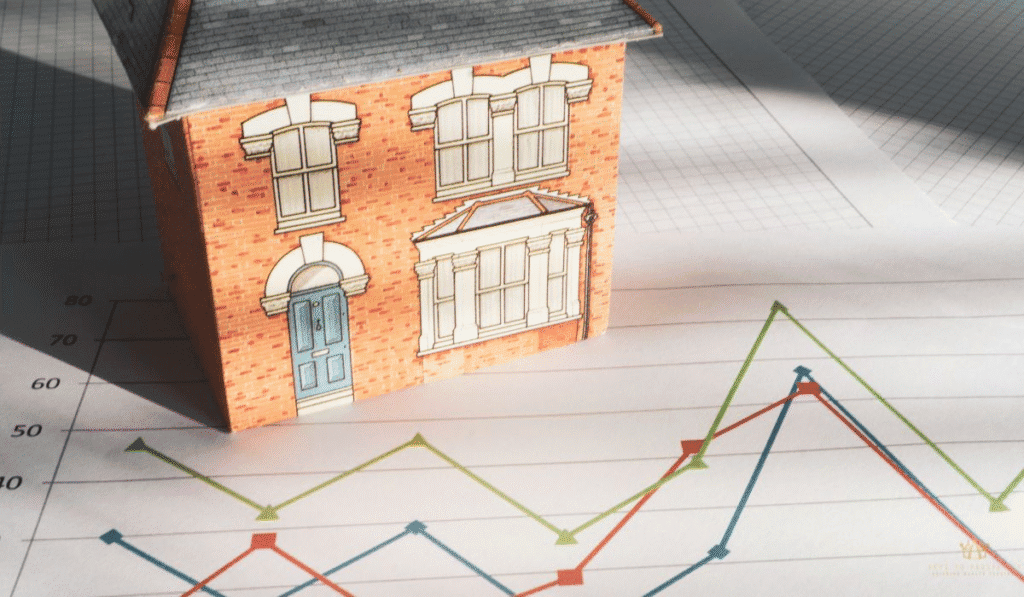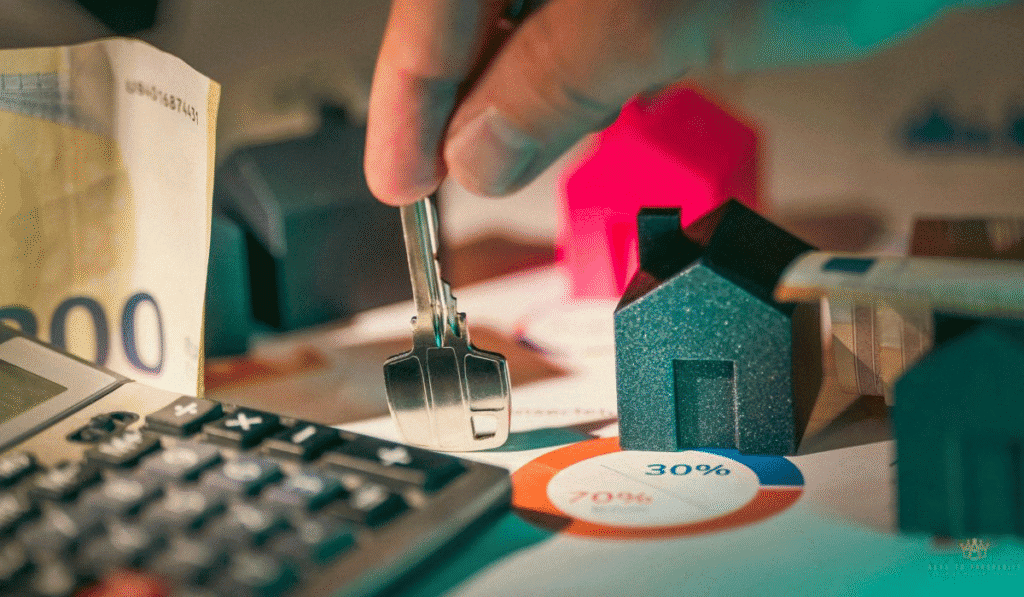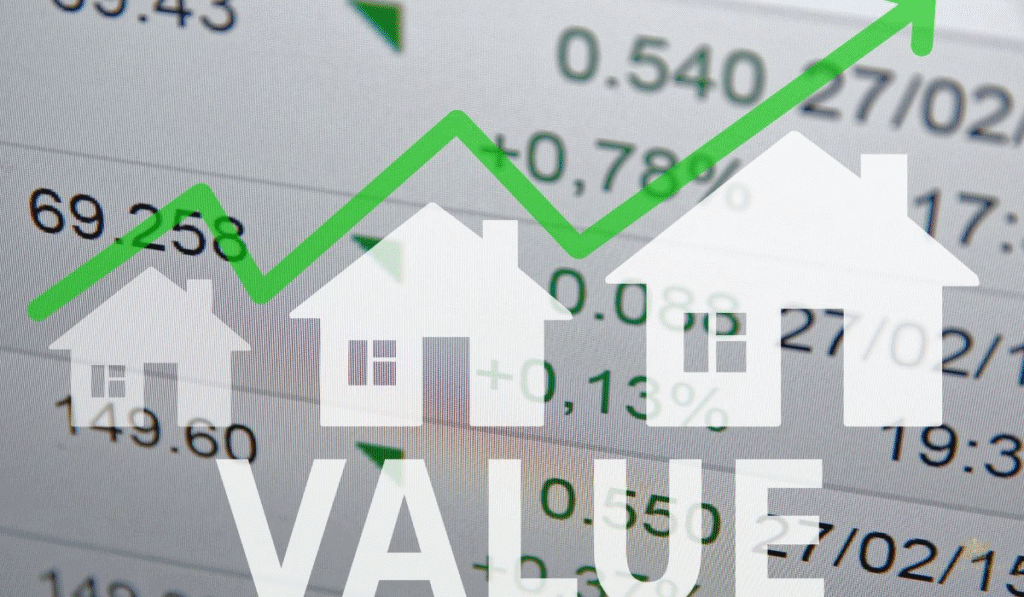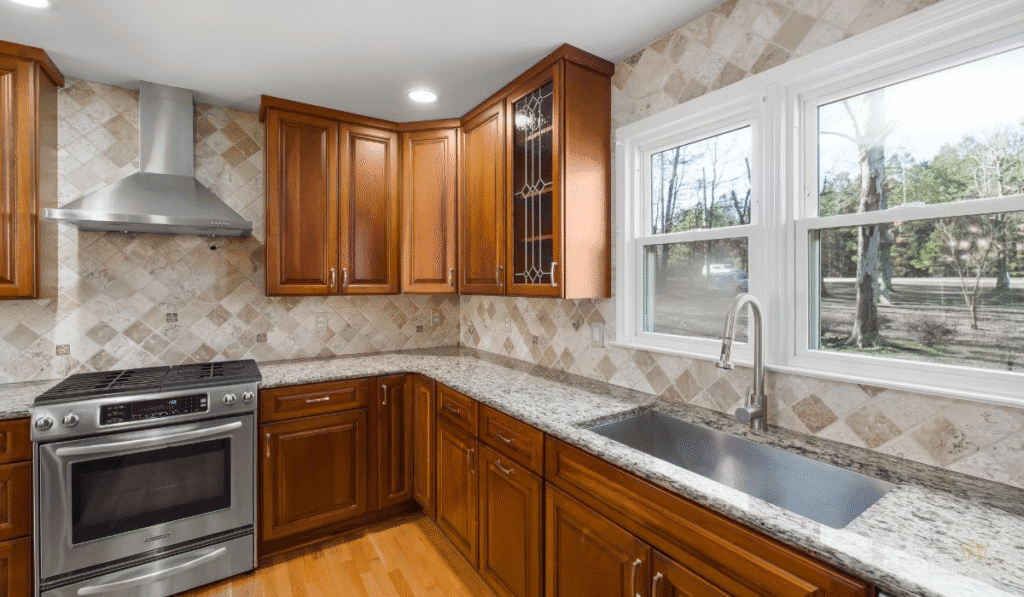Project Your Home’s Future Value With Our House Appreciation Calculator
Estimate how your home’s value might change over time using various scenarios. This calculator helps you see your property’s potential growth to make smarter future decisions.
Home Appreciation Calculator

Over the last five years, home prices across the country have jumped more than fifty percent, reshaping the entire housing market.
That kind of surge leaves many people—homeowners, buyers, and real estate investors—asking the same question: what will my property be worth in the future?
From our experience, the smartest way to start finding answers is with a house appreciation calculator.
It’s a simple tool that helps you calculate home appreciation, see where your property might be heading, and use those insights to make better choices for your financial future. This article will give you clear steps, valuable insights, and practical guidance you can actually use.
If you’ve been following our resources, you’ll notice how this ties into our other guides. A cap rate calculator can help you measure income potential. Our upcoming post will highlight how a real estate roi calculator sharpens your investment picture.
And our main property value calculator post rounds everything out, helping you see the big picture of your real estate journey.
Short Summary
- Master the home appreciation formula to project future home value from purchase price and appreciation rate over number of years.
- Feed a house appreciation calculator with current value, home improvements, and interest rates for estimated value and multiple scenarios.
- Watch market conditions like economic factors and local factors such as job growth to gauge appreciation potential.
- Turn insights into action: Sellers set sale price with a real estate agent, investors chase cash flow in real estate investment, and buyers link to financial future goals.
Home Appreciation Formula: Simple Steps To Calculate
So how does a home grows in value over time? It can be a bit complex, but with the right math and the right mindset, the process becomes a lot clearer.
The Core Equation
The home appreciation formula is a straightforward way to project value growth. The following formula looks like this:
Purchase price × (1 + appreciation rate) ^ number of years.
That’s it. With this simple formula, you can calculate appreciation and estimate where your property may stand in a given specified period.

Putting Numbers Into Play
Think of a house bought for $300,000. If the annual percentage growth is 3 percent over 10 years, the final value comes out close to $403,000. That’s how you calculate home appreciation in real terms.
This math uses the starting value, adds the compounding appreciation rate, and multiplies it by the number of years.
Knowing The Terms
There’s often confusion around home value, market value, fair market value, and final value. Here’s the difference:
- Home value is the general worth of your property in the current market.
- Market value is what a buyer is willing to pay right now.
- Fair market value factors in both sides—what’s reasonable given market demand and comparable sales.
- Final value is the projected worth after applying appreciation.
The Real-World Catch
There’ve been instances where someone looked only at sales history and expected the same growth ahead. That’s risky. For instance, a neighborhood may have grown at 6 percent annually in the past decade, but future conditions can slow things down.
That’s why relying on helpful tools like an appreciation calculator or a property appreciation calculator is smart. They give ballpark figures, but they don’t guarantee what’s ahead.
House Appreciation Calculator: Inputs, Benchmarks & Accuracy
A calculator is only as good as the data you feed into it. Sort of like GIGO – garbage in, garbage out. The house appreciation calculator works best when you know what numbers to plug in and how to read the results.
Key Inputs That Matter
Here are the must-have details for running accurate projections:
- Purchase price: the original cost of the home.
- Current value: what it’s worth today.
- Interest rates and monthly payments: especially important if home loans are involved.
- Home equity: the stake you hold after subtracting what’s owed.
Home improvements and property improvements: upgrades that boost the property’s base value.

What You Get Back
When done correctly, the tool returns an estimated value, a projected future value, and in some cases, graphs showing different outcomes.
A future home value calculator or home appreciation calculator often lets you run multiple scenarios to see both optimistic and conservative results. That way, you can compare how small changes in appreciation rate affect your long-term gain.
Using Benchmarks Wisely
The calculator gains more accuracy when you measure against the right standards. Think average annual appreciation or average appreciation rates in your city. For example, one market may see 2 percent yearly growth while another hits 4 percent.
Looking at comparable properties and what they sell for gives context, helping you see if your assumptions match fair market conditions.
Where Accuracy Stops
Here’s the reality: no tool is perfect. A sale price is ultimately decided by buyers and the real estate market at the time of listing. To get an accurate estimate, it’s smart to connect with a real estate agent or a professional appraiser.
They’ll validate what the house appreciation calculator shows and provide context that a formula can’t fully capture.
We Guide People How To Invest In Real Estate
Market Conditions & Local Factors That Impact Appreciation
Property values never rise in isolation. The bigger picture around us plays a huge role in shaping the value of your home and the value of the home you may buy.
Macro Drivers That Move Prices
Large-scale economic factors can swing appreciation in a big way. Shifts in interest rates directly affect affordability, while economic conditions like inflation or wage growth influence how much buyers can pay.
During economic downturns, we often see prices flatten or dip as demand cools. These broader economic conditions set the tone for growth or slowdown across the nation.
Local Drivers That Matter Most
On the ground, local market conditions often outweigh national headlines. Local factors like school quality, new infrastructure, or fresh amenities can draw families into certain areas. A good example is when neighborhood development brings in a shopping center or a new park—suddenly demand picks up. Homes in desirable neighborhoods tend to hold value better, especially where job growth and population growth keep steady.

Property Drivers You Control
Some value boosts come from within the property itself. Property increases from adding a finished basement or energy-efficient upgrades raise a home’s worth right away.
A property appreciation calculator helps show the impact appreciation of these improvements over a specified period. When owners think carefully about projects, the appreciation potential grows stronger.
Watching the Trends
Tracking market trends keeps expectations realistic. The real estate market runs in cycles, and the housing market in one city may move much faster than in another. Understanding both national market conditions and neighborhood data gives a clearer picture of future growth.
Turn Results Into Strategy: Pricing, ROI & Financial Future
Numbers only become powerful when you know how to act on them. Once you’ve run the calculator, the next step is turning those insights into smart strategies.
Seller Strategy
Use your estimated value as a starting point, but verify it with a real estate agent who knows current trends.
- A professional appraiser provides another layer of precision, helping you lock in a confident sale price.
- Keep the market value in mind since it reflects what buyers will actually pay in today’s market.
Investor Strategy
For real estate investment, running projections on an investment property highlights long-term potential.
- Break down cash flow carefully to see if rental income covers expenses and then some.
- Timing plays a significant role in maximizing returns, especially in fast-moving markets.
- Always consider the impact of market cycles on future appreciation before locking in a purchase.
Buyer Strategy
If you’re planning a future home, link your mortgage terms with appreciation estimates.
- Look at how home loans and monthly payments interact with the property’s potential for growth.
- Build equity steadily to improve your overall financial future.
- Use scenarios to see if buying now or waiting makes more sense for your goals.
Tax Strategy
Homeowners selling a primary residence may qualify for tax exclusions that reduce how much of their gain gets taxed.
- Always connect projected gains with net profit after costs like commissions and improvements.
- Keep in mind that past performance doesn’t predict exact results going forward.
- The goal is to make informed decisions with the help of qualified tax and real estate professionals.
Market Conditions & Local Factors That Impact Appreciation
Your home’s value doesn’t exist in a vacuum. It’s shaped by a powerful mix of national forces and hyper-local trends. These elements can help show the true appreciation potential of your property.
The Big Picture: National Economic Factors
Broader economic conditions set the stage for the entire housing market. Think of these as the tide that lifts or lowers all boats.
Two key economic factors are interest rates and job growth:
- Low interest rates make mortgages cheaper, boosting buyer demand and pushing house prices up. High rates can cool demand.
- Strong national job growth and a growing population create more potential homeowners.
Conversely, economic downturns can slow the real estate market as people become more cautious about big financial moves. Keep an eye on these market trends! It’ll help you understand the general direction of home prices.
Your Home’s Immediate Ecosystem: Local Market Conditions
While the national news gets attention, your value of your home is decided right in your backyard. Local market conditions are often the dominant force.
We see this all the time. A city might have average growth, but one suburb explodes because of a new school or tech company moving in. This is neighborhood development in action. Desirable neighborhoods with great amenities command higher prices.
Specific local factors like a new park, a drop in crime, or even the opening of a popular grocery store can directly impact appreciation. A town with strong job growth and an influx of new residents will almost always see property values rise faster than average.
What You Can Control: Property-Specific Upgrades
This is where your own actions directly influence your value of the home. Not all upgrades are created equal.
A property appreciation calculator can help you model the effect of renovations. Remember, property increases in value from upgrades that add functionality and square footage.

A kitchen remodel or adding a bathroom typically offers a better return than a luxury swimming pool. Think about improvements that future buyers will truly value. This strategic approach maximizes your appreciation potential from home improvements.
Turn Results Into Strategy: Pricing, ROI & Financial Future
A number from a calculator is just data. The magic happens when you transform that insight into a actionable plan for your wealth.
For The Home Seller: Setting The Right Price
If you’re selling, your estimated value from a calculator is a great starting point. But your final sale price must be grounded in reality.
We recommend you take that figure to a trusted real estate agent. They’ll perform a Comparative Market Analysis (CMA) to determine the precise market value based on recent sales of comparable properties.
This partnership ensures you don’t leave money on the table or price your home out of the market. Their expertise is crucial for setting a competitive and profitable sale price.
For The Real Estate Investor: Calculating True ROI
For an investment property, the calculation goes deeper than simple appreciation. You need to see the whole financial picture.
Your net profit depends on both value growth and cash flow. Run scenarios that include your mortgage, taxes, rental income, and maintenance costs. A real estate investment lives and dies by its numbers.
Timing also plays a significant role. Entering a market with strong job growth can accelerate your returns. A thorough analysis separates a good investment property from a poor one.
For The Future Homeowner: Planning Your Move
If you’re dreaming of your next future home, use these tools to plan your timeline. See how much home equity your current home might build in three or five years.
This projection helps you understand your budget for your next purchase. You can make smarter decisions about home loans and down payments. This forward-thinking is a cornerstone of a secure financial future.
It turns a vague dream into a structured, achievable goal.
A Final Word On Taxes And Informed Decisions
For most homeowners, the sale of a primary residence comes with a major tax benefit. You can often exclude a large portion of your net profit from capital gains taxes. This is a huge advantage. Remember, past performance never guarantees future results.
The entire point of this exercise is to make informed decisions based on research and expert advice, not just gut feelings. This thoughtful approach is how you build lasting wealth through real estate.
Final Thoughts
A house appreciation calculator is a powerful starting point. It offers valuable insights into what might be possible. But don’t forget this caveat: it provides a projection, not a promise.
Run those multiple scenarios. See how different average appreciation rates change your outlook. Then, take that information and look outward. Check your local market conditions. How does your estimate stack up against real homes selling in your area?
This research prepares you for a crucial next step. Have a conversation with a local real estate agent or a professional appraiser. They can ground your calculations in the reality of your neighborhood.
A property appreciation calculator informs your thinking, but expert human judgment solidifies your strategy.
Ready to explore more? Use our tools, read our guides, and continue building your confidence right here on our site. We are here to help you make sense of it all.



